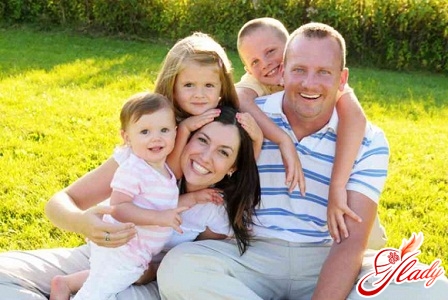 Sooner or later, but for the overwhelming majority of peoplethere is a desire to have children. However, alas, not all people are capable of fertilization, conception and birth of a child. But do not despair - physiological infertility is not a reason to refuse the opportunity to hear "Mom and Dad" sounding in your address. An adopted child can become your own if you want it. In Russia, there are several types of transferring a child to a new family: adoption, guardianship and others. This article will discuss such a form as a foster family. This form of family upbringing arose in Russia not so long ago - a little more than ten years ago. And many people do not have sufficient information or do not know about it at all. But it is this form of raising an adopted child that is the most accessible for the average family. The conditions under which it is possible to take a child into a foster family are more lenient than in case of adoption. First of all, guardianship authorities take into account the decency and reliability of the family, its desire to have children, and only then such factors as:
Sooner or later, but for the overwhelming majority of peoplethere is a desire to have children. However, alas, not all people are capable of fertilization, conception and birth of a child. But do not despair - physiological infertility is not a reason to refuse the opportunity to hear "Mom and Dad" sounding in your address. An adopted child can become your own if you want it. In Russia, there are several types of transferring a child to a new family: adoption, guardianship and others. This article will discuss such a form as a foster family. This form of family upbringing arose in Russia not so long ago - a little more than ten years ago. And many people do not have sufficient information or do not know about it at all. But it is this form of raising an adopted child that is the most accessible for the average family. The conditions under which it is possible to take a child into a foster family are more lenient than in case of adoption. First of all, guardianship authorities take into account the decency and reliability of the family, its desire to have children, and only then such factors as:
- The state of health of foster parents.
- The size of the wages of foster parents.
- The condition of housing conditions of foster parents.
In order for a foster family to be established, it is necessary for the foster parents and local guardianship and trusteeship authorities to enter into an agreement on the transfer of the child to the family.
Foster Family Agreement
The contract is drawn up in a strictly established form. It stipulates such nuances as:
- The period for which the child is transferred to foster care.
- Those conditions in which the child will live, learn and be educated.
- All those responsibilities that are placed on the shoulders of foster parents.
- All rights of foster parents.
- The duties that the guardianship and trusteeship bodies take in relation to the family that accepted the child's upbringing.
The agreement is drawn up in two copies andis signed by two parties - a representative of the guardianship and trusteeship authorities and one of the adoptive parents. One copy is kept by the guardianship authorities, and the second is given to the adoptive family. The contract is valid for the entire period for which it is concluded. However, there are a number of specific cases in which the contract may be terminated early. Such cases include:
- Serious illness
An illness of one of the adoptive parents that prevents them from properly fulfilling their responsibilities towards the child.
- Change in the marital status of the foster family
In the event that the spouses get divorced, the agreementThe child's upbringing in a foster family may be cancelled by decision of the guardianship council. In case of divorce, the foster parents must notify the guardianship council of this fact within three days.
- Change in the financial situation of the family
Of course, with a slight changethe financial situation for the worse, the guardianship and trusteeship authorities will not insist on removing the child from the foster family. However, if the foster parents have lost their jobs or housing, the guardianship council will realistically assess whether the foster parents can properly support the minor child.
- Personal conflicts between adopted children and parents
Of course, the process of adaptation of the child in the reception roomfamily very rarely goes smoothly, without any rough spots. However, if conflicts between the child and the adoptive parents arise regularly and are of a stormy nature, the guardianship and trusteeship authorities may raise the issue of early termination of the agreement.
- Conflicts between children in foster care
All of the above applies equally toconflicts between children in the family. If the parents fail to stabilize the psychological situation in the family and create a favorable microclimate, the contract may be terminated prematurely.
- Other adverse factors
The emergence of any other unfavorable factors that interfere with the normal upbringing and development of a child in a foster family may also lead to early termination of the contract.
- Return of the foster child to his biological parents
Very rarely, but still there are suchsituations when people deprived of parental rights are restored in their rights in relation to the child. This happens if the parents begin to lead a normal life, create favorable conditions for the child's life, and they manage to convince the court of this, the child can be returned to them. Accordingly, the contract with the foster family is terminated early.
- Adoption of adopted child
Parents who accept a child for upbringing inyour family, should be well aware of the fact that a foster family is not an adoption. And the child's data is in the general database of children subject to adoption. And it may happen that the adopted son or daughter who has become your own will be liked by some other married couple. And if they decide to adopt the child, the guardianship and trusteeship authorities will terminate the agreement.
Government payments to the foster family
The state provides support for suchfoster families. At the moment when a foster family is created, a one-time payment of 10,000 rubles is made from the regional budget for each of the children. Such a payment is made only once. Then, throughout the entire term of the contract, a certain amount is paid for the maintenance of each of the foster children. The amount of payments is determined by the administration of each Federal District of Russia. These funds are intended for the purchase of:
- Stationery
- Household goods
- Clothes and shoes
- For partial payment of utilities
In addition, all foster families that includeincludes three or more children, both adopted and their own, have the right to all the benefits that are provided by Russian legislation for large families. The adoptive family must begin receiving payments as soon as the child is transferred for upbringing.
Wages of foster parents
Another feature of a foster family is the fact that foster parents receive a salary for their work in raising a child. Its size varies and depends on such facts as:
- On how many children were taken to be raised in a family.
- From what is the health status of foster children.
As of today, for two adopted childrenParents receive 4 minimum wages, for three or more - 5 minimum wages. In the event that the adopted child has not reached the age of three, or has any deviations in both mental and physical development, the amount of wages for adoptive parents increases by another 30%.
Duties of foster parents
When deciding to adopt a child into your own carefamily of an adopted child, parents should think it over carefully and take this step only consciously, and not guided only by a burst of noble emotions. After all, we are not talking about some toy or thing that can be put on the shelf because it is no longer needed. The first emotional impulse passes quickly, and the little person and you will live side by side for a very long time, and perhaps for life. By accepting a child into the family, parents take on a number of responsibilities. For example, the following:
- Engage in raising a child.
- Carefully monitor his health.
- To create a psychological atmosphere in the family that is favorable for the child.
- Monitor the learning process of the child.
- Protect the rights of the child and represent his interests, including in court.
However, as a rule, if the parentslove their adopted child, fulfilling these responsibilities does not burden them. Otherwise, there is no point in starting the whole epic of creating a foster family, otherwise this venture will turn into a headache and will bring nothing but disappointment.
Rights of foster parents
However, in addition to a number of responsibilities, adoptive parents also have rights:
- Take care of foster child
Any married couple that meets certain requirements has the right to submit an application to the guardianship and trusteeship authorities expressing their desire to create a foster family.
- The right to personal education of a child
The rights to raise an adopted child are exactthe same as the rights to raise one's own. No one has the right to tell adoptive parents what scheme to follow to raise a child and in what ways, unless this upbringing does not harm the child's physical condition and psychological health.
- The right to receive cash benefits
As already mentioned, any such family has the right to receive a monthly allowance for each adopted child.
- Right to benefits
There are a number of benefits that are available to any foster family. You can find out the list of these benefits from your guardianship and trusteeship authority.
- The right to free medicine
Despite the fact that adoptive parents cannotobtain a compulsory medical insurance policy for a child, medical care for these children is also free. Guardianship and trusteeship authorities should take care of obtaining policies.
- Right to pay
As already stated, all adoptive parents have the right to be paid for their work in full and on time.
- The right to benefits, which are stipulated by the pension and labor legislation
- The right to increase in the length of service
According to Russian legislation, the total length of service includes the time during which parents care for adopted children.
Rights of the adopted child
Children accepted into foster care retain a number of rights, such as:
- The right to alimony
All children whose biological parents have been deprived of parental rights retain the right to receive alimony, regardless of whether they are being raised in a foster family or not.
- Right to receive a social family
A child being raised in a foster family has the right to receive a disability pension or a survivor's pension.
- The right to use the living space
An adopted child has the right to retain ownership of the living space that belongs to him or the right to use it.
- The right to communicate with relatives
If the adoptive parents do not object, the child can periodically meet and communicate with his blood relatives and biological parents.
Summing up
So, after reading this article, you gotthe most complete information about such a form of upbringing children left without parental care as such a family. Carefully weigh all the pros and cons. And who knows, perhaps it is such a family that will allow you to feel like parents. And remember that it is not so important whether the child is adopted, taken into guardianship or accepted for upbringing in a foster family. The most important thing that is necessary for a happy joint future and a prosperous tandem "Parents - child" is your complete understanding of the child, readiness to accept him and, of course, the most important component of success is a huge and boundless love for the child! We advise you to read:








